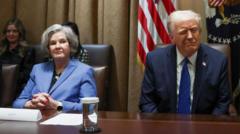The ruling pits the judicial system against executive authority, casting uncertainty over US trade relations.
Court Strikes Down Trump's Tariffs: A Major Setback for Trade Policies

Court Strikes Down Trump's Tariffs: A Major Setback for Trade Policies
US federal court rules against sweeping tariffs, emphasizing Congress's exclusive power over trade.
The Court of International Trade in the United States has delivered a significant blow to President Donald Trump’s trade policies by blocking his sweeping tariffs imposed on numerous countries. The decision comes after the court determined that the emergency law invoked by the Trump administration does not grant the president unilateral power to impose these tariffs.
In a ruling made in Manhattan, the judges highlighted that the United States Constitution bestows exclusive power for regulating international commerce to Congress, a power they stated is not overridden by the president’s ability to take actions to safeguard the economy. Following the court's decision, the Trump administration quickly filed an appeal.
The court ruling also puts a stop to additional tariffs that had been levied against China, Mexico, and Canada since Trump's administration returned to office. These tariffs were initially justified as necessary to combat what the administration deemed an unacceptable influx of drugs and unauthorized immigrants into the U.S.
Kush Desai, the White House deputy press secretary, asserted that it is not the place of "unelected judges" to dictate how the executive branch manages national emergencies. He reaffirmed Trump’s commitment to prioritizing American interests and using all available powers to address the challenges facing the nation.
The legal challenge came from the nonpartisan Liberty Justice Center, representing a coalition of five small businesses adversely impacted by the tariffs. Attorney General Letitia James of New York, one of the states engaged in the lawsuit, expressed approval of the court's decision, arguing that no president should have the power to unilaterally increase taxes at will. She warned that the continuation of these tariffs would have resulted in increased inflation, harm to businesses, and job losses throughout the nation.
This case represents one of several legal efforts opposing Trump’s trade policies, as well as challenges launched by 13 states and various small business groups. The three-judge panel stated that the International Emergency Economic Powers Act of 1977—used by Trump to justify his tariffs—does not grant him such extensive authority, asserting that the implemented tariffs exceed any powers designated to the president under the act.
Financial markets reacted positively to the ruling, with significant increases noted in Asia’s stock exchanges, including a 1.5% rise in Japan's Nikkei 225 index, and similar upward trends for US stock futures, suggesting a bullish sentiment among investors looking to gauge the future economic landscape in light of these developments.
In a ruling made in Manhattan, the judges highlighted that the United States Constitution bestows exclusive power for regulating international commerce to Congress, a power they stated is not overridden by the president’s ability to take actions to safeguard the economy. Following the court's decision, the Trump administration quickly filed an appeal.
The court ruling also puts a stop to additional tariffs that had been levied against China, Mexico, and Canada since Trump's administration returned to office. These tariffs were initially justified as necessary to combat what the administration deemed an unacceptable influx of drugs and unauthorized immigrants into the U.S.
Kush Desai, the White House deputy press secretary, asserted that it is not the place of "unelected judges" to dictate how the executive branch manages national emergencies. He reaffirmed Trump’s commitment to prioritizing American interests and using all available powers to address the challenges facing the nation.
The legal challenge came from the nonpartisan Liberty Justice Center, representing a coalition of five small businesses adversely impacted by the tariffs. Attorney General Letitia James of New York, one of the states engaged in the lawsuit, expressed approval of the court's decision, arguing that no president should have the power to unilaterally increase taxes at will. She warned that the continuation of these tariffs would have resulted in increased inflation, harm to businesses, and job losses throughout the nation.
This case represents one of several legal efforts opposing Trump’s trade policies, as well as challenges launched by 13 states and various small business groups. The three-judge panel stated that the International Emergency Economic Powers Act of 1977—used by Trump to justify his tariffs—does not grant him such extensive authority, asserting that the implemented tariffs exceed any powers designated to the president under the act.
Financial markets reacted positively to the ruling, with significant increases noted in Asia’s stock exchanges, including a 1.5% rise in Japan's Nikkei 225 index, and similar upward trends for US stock futures, suggesting a bullish sentiment among investors looking to gauge the future economic landscape in light of these developments.




















